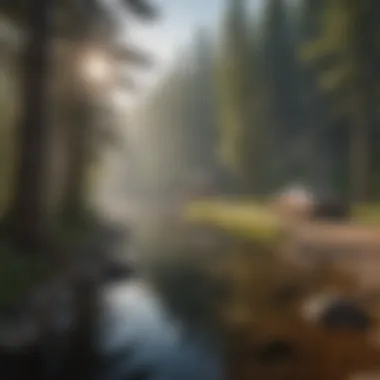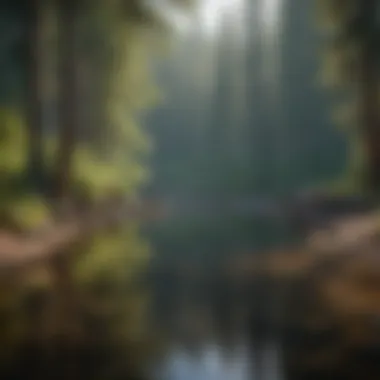Bass Lake Campsites: An In-Depth Exploration


Intro
Bass Lake, nestled in a picturesque landscape, hosts a variety of campsites that cater to numerous outdoor enthusiasts. Understanding these campsites will enhance your experience and connection with nature. This guide aims to spotlight the ecological significance, sustainability practices, and community engagement associated with the Bass Lake campsites.
Forest Ecology and Biodiversity
The health of forest ecosystems is paramount, particularly in areas around Bass Lake. Forests play a critical role in maintaining biodiversity. They provide habitat for wildlife, contribute to carbon sequestration, and guard against soil erosion. Recognizing how the ecosystem operates is essential for campers seeking to preserve its integrity.
Importance of Forest Ecosystems
Forests exist not only as a resource for recreational activities but also as living systems that sustain various forms of life. They act as natural air purifiers and are indispensable for climate regulation. Understanding this balance is key for campers who wish to engage respectfully with nature.
Flora and Fauna in Woodlands
Bass Lake encompasses a rich diversity of flora and fauna. Prominent tree species include Ponderosa Pine, Giant Sequoia, and Sugar Pine. Migratory birds, deer, and small mammals like squirrels also inhabit the area. Observing these species in their natural habitat can greatly enhance the camping experience, but it requires scrutiny and respect to preserve their homes.
"Preservation of nature ensures the well-being of future generations, making it essential for campgoers to embrace responsible practices."
Sustainable Forestry Practices
Partaking in sustainable forestry is fundamental for maintaining the health of Bass Lake and its surroundings. Those camping here must understand the implications of their activities.
Techniques for Responsible Management
Responsible management techniques include selective logging that minimizes damage to existing trees and planting new trees to replace those removed. Techniques like these promote ecosystem resilience, maintain habitat, and support local biodiversity.
Certification Schemes and Standards
Many forestry practices are monitored under certification schemes. Initiatives such as the Forest Stewardship Council (FSC) set certain standards that help ensure healthy forest ecosystems. Campers should look for products and services that adhere to these standards to support sustainable practices.
Community Engagement and Stewardship
Community involvement plays a significant role in fostering a respectful camping culture. Local communities surrounding Bass Lake often offer resources and support for both new and seasoned campers.
Role of Local Communities
Local communities work diligently to protect Bass Lake’s unique ecological features. Through various programs, they engage with visitors to raise awareness about environmental stewardship and responsible camping practices. Collaboration with these communities not only enhances camping experiences but also strengthens conservation efforts.
Volunteer Opportunities for Engagement
There are numerous avenues for campers to get involved. Many local initiatives welcome volunteers for clean-up days and educational programs. Engaging with these opportunities helps campers learn about the local ecology while contributing positively to the community and environment.
Intro to Bass Lake Campsites
Bass Lake offers a unique opportunity for camping enthusiasts who seek a connection with the natural world. Understanding the available campsites at Bass Lake is crucial in enhancing one's experience during a visit. This section highlights significant aspects, benefits, and considerations for visitors.
Location and Significance
Bass Lake is situated in the Sierra National Forest, close to several popular attractions. Its wide variety of landscapes, including the lake, mountains, and forests, make it significant for outdoor activities. Campers can benefit from both the recreational opportunities and the serene atmosphere. The site plays a vital role in conservation efforts and supports local biodiversity, making it an important spot for those who appreciate the environment.
Types of Campsites Available
Exploring the types of campsites available at Bass Lake is essential in choosing the right location for your camping experience. Each type serves different needs and preferences. The three main types of campsites include:
Standard Campsites
Standard campsites are the most common option. They provide basic amenities such as picnic tables and fire pits. These features make them a beneficial choice for families and first-time campers. The proximity to service areas, like restrooms and water sources, adds to their appeal. However, one might find these sites crowded during peak season, which could detract from the private camping experience.
Group Campsites
Group campsites cater to larger parties. These sites typically accommodate multiple tents and can hold several people, making them ideal for gatherings. A key characteristic is the spacious layout that promotes social interaction among campers. A unique feature is the ability to reserve these sites in advance, ensuring a place for friends or family to enjoy outdoor activities together. The downside could be potential noise from larger groups, affecting those seeking solitude.


Backcountry Sites
Backcountry sites are a distinct choice for the adventurous. These sites require a hike to access, offering a sense of seclusion. They appeal to campers who desire a more rugged and solitary experience. The absence of amenities like running water or bathrooms requires campers to be more self-sufficient and knowledgeable about wilderness survival skills. While this adds challenge, it also enhances the sense of accomplishment and connection to nature.
The variety of campsites at Bass Lake caters to distinct needs and preferences, ensuring that every visitor can find a suitable place to connect with nature.
Campsite Amenities
Campsite amenities play a crucial role in shaping the overall experience of campers at Bass Lake. Understanding the available amenities helps visitors to prepare adequately and choose the most suitable site according to their needs. Essential features can enhance comfort and safety, contributing significantly to a pleasant outdoor adventure. These variables tend to impact functionality, leisure options, and the overall enjoyment of nature.
Water Sources and Sanitation
At Bass Lake, access to water is fundamental for all camping activities, including cooking, cleaning, and drinking. Many campsites offer water sources such as tap water, lakes, or streams nearby. It is vital for campers to verify the quality of these sources. Drinking untreated water can pose health risks. Typically, classified sources fulfill safety standards, yet caution is recommended.
Sanitation facilities also vary across campsites. Some locations provide restrooms and showers, while others might only have basic outhouses. Understanding the availability and type of sanitation is important for planning the stay. Campers should carry biodegradable soap and toilet paper to ensure they adhere to the Leave No Trace principles. This careful consideration promotes personal health and aids in preserving the ecological integrity of the area.
Cooking Facilities
When it comes to preparing meals, cooking facilities enhance the camping experience significantly. While some sites offer picnic tables and fire pits, others may require campers to bring their own cooking gear. Campers must check for the existence of shared grills or communal fire circles, as these can be useful for larger groups. Using a camp stove or portable grill can be a practical alternative in sites without established facilities.
It is crucial to maintain cleanliness while cooking. This includes properly disposing of food scraps and using bear-proof containers when necessary, especially in wilderness areas. Ensuring nearby food storage can reduce the risk of wildlife encounters, keeping both campers and animals safe.
Tent and Recreational Areas
The arrangement and quality of tent sites can greatly influence comfort. Some campsites at Bass Lake provide designated, leveled spots for pitching tents, while others may allow camping in more open areas. Proper selection of a tent area is fundamental to ensure protection against environmental elements. Tent locations should ideally find balance in proximity to water sources and safety from potential hazards such as falling branches.
Recreational areas are also essential elements of campsite amenities. Facilities may include spaces for playing games, hiking paths, or even picnic spots. These elements enable campers to engage with the environment and socialize with fellow visitors. However, it is important to respect the wilderness by limiting disturbances during wildlife activities, thus benefiting both the campers and the ecological system.
"Understanding every aspect of campsite amenities enhances the overall camping experience at Bass Lake, ensuring to make informed decisions for a comfortable and responsible visit."
Accessibility Considerations
Accessibility considerations are crucial when evaluating campsites at Bass Lake. Preparing for camping involves not only selecting the right spot but also ensuring that the site is reachable and usable for all potential campers. This section addresses important elements related to accessibility, including how they benefit outdoor enthusiasts and what considerations should be made.
Road and Trail Access
Accessing the campsites starts with understanding the road conditions leading to Bass Lake. Many enthusiasts arrive via personal vehicles or by renting cabins near the site. Well-maintained roads are often crucial for easier access. However, some backcountry sites may require navigating rougher terrain. It is wise to consult trail maps and local guides to determine which routes are suitable for your vehicle type.
Paths leading to the campsites must also be taken into account. They vary in width and condition, affecting how accessible they are, especially for those with mobility aids. Individuals planning to hike should review the trail ratings and select options that match their ability level.
Ensure you check local travel advisories if weather conditions can affect accessibility.
Public Transport Options
For those who do not wish to drive, public transport provides another avenue for accessing Bass Lake. Local bus services may run routes close to the lake, although their frequency could be limited. Researching schedules in advance is important. Additionally, some outdoor adventure companies offer shuttling services that connect popular urban areas with the lake region.
When using public transit, be mindful of your equipment and gear. Not all buses or vans can accommodate large or numerous items. Checking with the transport provider about their specific policies is important to avoid inconveniences during travel.
Accommodations for Disabilities
Bass Lake endeavors to be inclusive for all visitors, including those with disabilities. Campsites designed for accessibility comply with specific guidelines to ensure a comfortable experience. These sites usually offer features such as flat and firm ground, accessible picnic tables, and restrooms that are wheelchair friendly.
In addition, some trails have been modified for easier travel for individuals with mobility challenges. Collaborating with local organizations that focus on outdoor access can help in obtaining reliable and updated information about these accommodations.
Consider contacting visitor centers located in the area for personalized advice and resources tailored to specific needs.
Lastly, it is paramount for campers to plan accordingly and consider personal needs before arrival. Knowing the available accommodations can help forge a more inclusive camping experience.
Regulations and Guidelines
Understanding the regulations and guidelines regarding camping at Bass Lake is crucial for ensuring not just compliance but also safety and sustainability. These rules are implemented to protect the natural environment and enhance the camping experience for all visitors. Familiarity with such guidelines can significantly influence whether your visit will be enjoyable and leave a positive impact on the area.


Permits and Reservations
Before making plans to camp at Bass Lake, it is essential to recognize that certain areas may require permits or reservations. Depending on the specific site and the time of year, these may have to be secured in advance. Many campsites operate on a first-come, first-served basis, yet the more popular spots can fill quickly, particularly during peak seasons.
Typically, obtaining a permit involves several steps:
- Identify the campsite type: Knowing whether you are heading to a standard campsite, collective site, or backcountry site guides your permit requirements.
- Check availability: Online resources or visitor centers provide vital information on open slots.
- Complete the application: Most permits can be applied for online, through official platforms.
- Pay applicable fees: Be prepared to pay any associated fees when applying for your permit.
Ensuring proper permits are acquired not only provides you access but also supports conservation efforts in the area.
Wildlife Protection Practices
Preserving the local fauna is a critical aspect of camping in Bass Lake. Wildlife protection practices are enforced to maintain ecological balance and keep both animals and campers safe.
Some ways to adhere to these practices include:
- Proper food storage: Store food securely away from sleeping areas to prevent attracting wildlife, reducing interactions between campers and animals.
- Observe wildlife from a distance: Approach to observe wildlife can stress animals. Maintain a respectful distance and refrain from feeding them.
- Leave no traces: Dispose of waste properly and minimize campfire residues to limit your impact on the environment.
Adopting these practices fosters a respectful coexistence with nature and aligns with the collective goal of preserving Bass Lake's delicate ecosystem.
Fire Regulations
Fires can enhance the camping experience but come with regulations to mitigate risks. Bass Lake has specific fire regulations to prevent potential wildfires and protect the local environment.
Here are key points to consider:
- Designated fire areas: Always use designated fire pits or grills to ensure safety and compliance. It prevents wildfires that can occur due to unattended flames.
- Fire bans: Be aware of fire bans which may be in place during severe weather conditions. Check local advisories that may impact your plans.
- Extinguishing fires: Ensure fires are fully extinguished before leaving your campsite. This practice minimizes the risk of rekindling.
Adhering to fire regulations not only protects the lush environment of Bass Lake but also acts as a responsible camping practice that others can admire.
"By respecting the regulations and guidelines of Bass Lake, campers not only enjoy a safer experience but also contribute positively to the conservation of this natural treasure."
Familiarizing yourself with these regulations will enable you to appreciate Bass Lake fully while preserving its unique environment for future generations.
Environmental Impact and Conservation
Understanding the environmental impact and conservation practices at Bass Lake is essential for all outdoor enthusiasts. The region is home to unique ecosystems that must be preserved for future generations. When campers are aware of their actions and the direct effects on their surroundings, they can contribute to better conservation outcomes. This section discusses critical aspects such as the Leave No Trace principles, biodiversity considerations, and ongoing restoration efforts. Each factor plays a vital role in maintaining the health of the natural environment at Bass Lake.
Leave No Trace Principles
Following Leave No Trace principles is fundamental when camping at Bass Lake. These guidelines help minimize human impact on the wilderness. Here are the main principles:
- Plan Ahead and Prepare: Research the area, understand the rules, and prepare accordingly.
- Travel and Camp on Durable Surfaces: Stick to established trails and campsites. This helps protect sensitive vegetation.
- Dispose of Waste Properly: Carry out what you bring in, including trash and food scraps.
- Leave What You Find: Preserve the natural features and cultural artifacts for others to enjoy.
- Minimize Campfire Impact: Use a stove for cooking instead of open fires, if possible, and only use designated fire rings.
- Respect Wildlife: Observe animals from a distance and never feed them, as it disrupts their natural behavior.
- Be Considerate of Other Visitors: Keep noise levels down and yield to other hikers on the trail.
Employing these principles allows campers to enjoy the beauty of Bass Lake while ensuring its protection for wildlife and future visitors.
Biodiversity Considerations
Biodiversity is vital for maintaining the ecological balance of Bass Lake. The area supports a variety of plants and animals, some of which are endemic or threatened. Campers should be aware of these species and the environment they inhabit.
- Native Plants: Protecting native plants, which provide food and habitat for local wildlife, is essential. They are better adapted to the local conditions and require less water and maintenance compared to non-native species.
- Wildlife Habitat: Understanding the needs of species such as deer, birds, and aquatic life can enhance visitors' experiences and contribute to wildlife conservation. Respecting their habitats minimizes stress on these populations.
- Invasive Species: Campers should be vigilant about invasive species, which can disrupt the local ecosystem. Cleaning gear and not introducing foreign plants or animals is crucial in preventing their spread.
Conserving biodiversity at Bass Lake is not just an environmental responsibility; it enriches the camping experience.
Restoration Efforts in the Area
Various organizations and volunteers are engaged in restoration efforts to rehabilitate areas of Bass Lake impacted by human activity. These initiatives include:
- Revegetation Projects: Replanting native species where invasive plants have taken over or where natural regrowth is insufficient.
- Erosion Control: Implementing measures to stabilize soil and protect against erosion along popular trails and campsites.
- Clean-up Drives: Frequent efforts are held to remove litter and debris from the shores of Bass Lake and surrounding areas.
- Community Engagement: Programs that involve local volunteers in restoration foster a sense of stewardship toward the environment.
"Efforts to restore ecosystems are as important as conservation measures. Each act of restoration brings us closer to a balanced environment."


Overall, understanding these environmental impact and conservation aspects is crucial for anyone hoping to enjoy Bass Lake's camping opportunities. By following guidelines centered on responsibility and respect, campers contribute to the longevity of this beautiful landscape.
Activities and Experiences
Engaging in various activities at Bass Lake significantly enhances the camping experience. The diversity of options allows for a robust interaction with nature. This area caters to different preferences, whether one seeks solitude or social interaction. Understanding these activities not only enriches the enjoyment but also fosters a deeper appreciation for the surrounding environment. Each opportunity contributes to the broader experience of being outdoors, highlighting the natural beauty and ecological diversity of Bass Lake.
Hiking Trails
Hiking trails in and around Bass Lake offer a range of experiences for all skill levels. The trails vary from easy walks to challenging hikes, making it accessible for families, solo adventurers, and more seasoned hikers alike.
Some notable trails include:
- Bass Lake Loop: This moderate trail provides scenic views of the lake and its crystal-clear waters.
- Mountain Ridge Trail: A more challenging trail that offers breathtaking vistas and an elevation gain that will leave one feeling accomplished.
- Wildflower Pathway: Ideal for leisurely walks, especially in spring when blooms abound.
Hiking not only encourages physical activity but also enables participants to witness local flora and fauna up close. The trails are often well-marked, but it is wise to have a map or GPS device to navigate effectively. Exploring these paths deepens an appreciation for the local ecosystem, as hikers encounter various plant species and possibly small wildlife. Safety and awareness of one's environment are critical, as weather conditions can change rapidly.
Fishing Opportunities
Fishing at Bass Lake attracts many enthusiasts looking for a rewarding outdoor experience. The lake is home to an array of fish species, including trout, bass, and perch. Anglers can enjoy fishing from the shore or venture out on a kayak or canoe. Specific areas are known for better catches, and local regulations should be reviewed before fishing.
Considerations for a successful fishing experience include:
- Timing: Early morning or late afternoon often yields better results.
- Equipment: Depending on the type of fish, varying setups may be required.
- Licenses: Ensure that you have the proper fishing license as required by local regulations.
Fishing at Bass Lake not only provides recreation but can also foster relaxation and reflection. The experience helps develop skills in patience and casting, and for many, fishing is about more than just the catch. It serves as a chance to bond with nature and unwind from daily stresses.
Wildlife Watching
Wildlife watching is another enriching experience at Bass Lake. The area supports a wide array of species, including birds, mammals, and reptiles. Observing these creatures in their natural habitat can be a profound experience.
Some tips for wildlife watching include:
- Timing: Early mornings and dusk are the most active times for many species.
- Equipment: Binoculars and a field guide can enhance the experience.
- Patience: Remain still and quiet to increase the chance of sightings.
Local species to watch for include:
- Deer: Frequently seen grazing in the early morning.
- Birds: Such as the American Robin and the Bald Eagle are notable sightings.
- Small Mammals: Including squirrels and raccoons.
Being attentive and respectful towards wildlife is crucial. Observing them from a distance ensures safety for both the observer and the animal. Wildlife watching instills a sense of connection to nature and encourages a mindset focused on preservation and respect for the environment.
"Engaging with nature through various activities fosters a greater understanding of ecosystems while enhancing personal enjoyment."
Planning Your Visit
Planning a visit to Bass Lake requires thoughtful consideration of various elements. It is essential to understand that proper planning enhances the overall experience and safety of the camping trip. Not only does it help in making effective use of time, but it also fosters a stronger connection with nature. A well-organized approach assures that you have the necessary equipment and knowledge to enjoy the rugged beauty of the area.
Best Times to Camp
The seasonal variations play a significant role in determining the best times to camp at Bass Lake. Typically, the camping season spans from late spring to early fall, with June through September being the peak months. During the summer, the weather is generally warm, providing ample opportunity for outdoor activities. However, this period can also bring larger crowds and higher reservation demand.
For those seeking solitude and cooler conditions, late spring and early fall are favorable alternatives. In late spring, you may witness lush landscapes and blooming wildflowers, presenting a vibrant panorama. Conversely, early fall often showcases stunning foliage, adding scenic charm to your experience. Always monitor climate trends prior to your visit to choose a time that aligns with your preferences.
Packing Essentials
Packing correctly can make or break a camping experience. Start by creating a checklist of essential gear before setting off. Focus on the following categories:
- Shelter: Tent, tarp, and ground pads.
- Sleeping Gear: Sleeping bags suited for the temperature range and sleeping pads for comfort.
- Clothing: Weather-appropriate layers, including moisture-wicking fabrics.
- Cooking Supplies: Portable stove, cooking utensils, and food storage bags.
- Safety Equipment: A first aid kit, headlamps, and multi-tools.
- Navigation Tools: Maps, compasses, or GPS devices.
Pack your items strategically, ensuring heavier items are at the bottom of your pack for balance. Pay attention to personal preferences for space and comfort, as well. Each camper may have unique requirements based on their individual experiences and needs.
Safety Precautions
Ensuring safety while camping is crucial and involves being prepared for various situations. Understand that the wilderness presents unique challenges that necessitate vigilance. Here are some key precautions to consider:
- Fire Safety: Follow local regulations and be aware of fire risk levels. Always have water nearby when managing a campfire.
- Wildlife Awareness: Keep a safe distance from animals and properly store food to avoid attracting them.
- Weather Preparedness: Keep an eye on weather forecasts and prepare for sudden changes. Storms can develop quickly, so be ready.
- Navigational Caution: Familiarize yourself with the surroundings and paths before heading out. Hike with a companion when possible.
"Being well-prepared not only ensures a safer experience but also allows you to fully immerse yourself in the beauty of Bass Lake."
In summary, careful planning for various aspects of your trip to Bass Lake will equip you for a fulfilling adventure while safeguarding your health and well-being.















